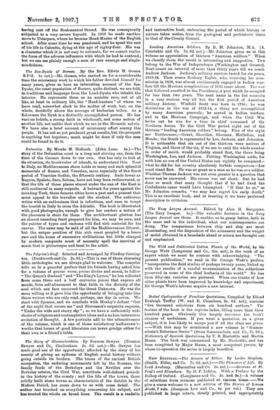Leading American Soldiers. By R. M. Johnston, MA. (A. Constable
and Co. 7s. (3d. net.)—Mr. Johnston gives 1113 in this volume an appreciation of thirteen "American soldiers." When we classify them the result is interesting and suggestive. Two belong to the War of Independence (Washington and Greene). Next comes an interval of more than thirty years till we reach Andrew Jackson. Jackson's military services lasted for six years, 1813-18. Then comes Zachary Taylor, who, receiving his com- mission in 1808, was almost continuously engaged in Indian war- fare till the Mexican complications of 1845 came about. The war that followed resulted in the Presidency, a post which he occupied for less than two years. The next name in the list connects in a very curious way all but the first period of American military history. Winfield Scott was born in 1786; he won distinction in the war of 1812-14, a thing not accomplished by many American generals ; he served in Indian warfare, and in the Mexican Campaign, and when the Civil Wee broke out he was for a time in chief command of the Northern forces. To the Civil War period eight out of the thirteen "leading American solders" belong. Five of the eight are Northerners,—Grant, Sheridan, Sherman, McClellan, and Meade ; the South is represented by Lee, Jackson, and Johnston. It is noticeable that six out of the thirteen were natives of Virginia, and three of the six, if we are to rank the whole number in order of merit, would probably stand first, the three being Washington, Lee, and Jackson. Putting Washington aside, for with him no son of the United States can rightly be compared— what he did for his country absolutely forbids -comparison—Lee must stand first. He was as great as a man as he was as a soldier. Whether Thomas Jackson was not even greater is a question that never can be answered. His career was out short. But he had done so much that many thought that if he had lived the Confederate cause would have triumphed. "If that be so," as Mr. Johnston remarks, "we may less regret his early death." This is an excellent book, and in treating it we have preferred description to criticism.






























































 Previous page
Previous page